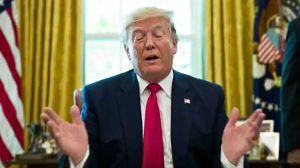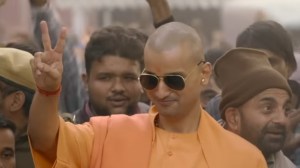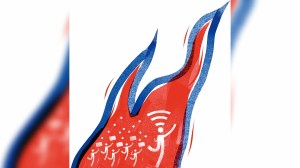In Myanmar, road blocks on freedom’s trail
Her car has been shunted to the side of the road. The air has been let out of its tires. Military authorities say they are offering her fo...

Her car has been shunted to the side of the road. The air has been let out of its tires. Military authorities say they are offering her food and medical care, but they are also making sure that she is going nowhere….An official of her party described the roadside sit-in as a “war of endurance.” It is a phrase that applies equally well to her 12-year battle of wills with the military rulers of Burma.
“The story hasn’t changed very much over the years,” a Western diplomat said. “It’s a standoff between the government and Aung San Suu Kyi and her movement. It’s perhaps worse to the extent that the government now seems engaged in an attempt to destroy her party definitively once and for all.”As the years have passed and her party members have been jailed or forced to halt their political activities, Daw Aung San Suu Kyi’s options have narrowed. She has been struggling just to keep her movement alive and to hold the attention of foreign governments that is perhaps her political lifeline.
The military leadership of Burma is equally stubborn.In 1988, when virtually the entire population rose up against three decades of military repression, the army crushed huge demonstrations by force, taking hundreds of lives.
In 1990, with Daw Aung San Suu Kyi under house arrest, her party won an overwhelming victory in a surprisingly free parliamentary election. The military reacted by annulling the results and tightening its grip on power.In 1995, she was freed from formal house arrest but found herself surrounded by security officers and restricted in her movements and political activities.
When her husband, a British scholar, was dying of cancer two years ago, the government denied him permission to visit her, suggesting that it would be more appropriate for her to visit him abroad. She refused, convinced that the government would prevent her from returning, and he died without seeing her.
Her current foray out of the capital, Rangoon, demonstrates the weakness of her position as well as its strength. It shows how few options she has to challenge Burma’s leaders but also how little she needs to do to draw international attention.
“She needs to keep people not only in Burma but the rest of the world aware of the continuing repression and deprivation of rights in Burma,” said Sunai Phasuk, a political scientist at Chulalongkorn University in Bangkok. “I think she is clever in her timing because there are reports that Western countries are reassessing their policies toward Burma.”Her gesture drew immediate statements of support from the United States and Britain as well as Amnesty International, the London-based rights organisation….
Excerpted from `A War of Endurance For Burma’s Laureate’, by Seth Mydans, New York Times Service, International Herald Tribune, August 29
Photos





- 01
- 02
- 03
- 04
- 05


























